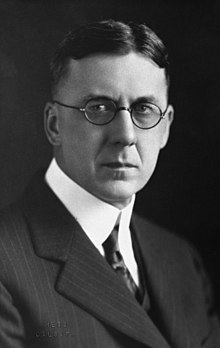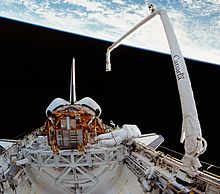Portal:Canada
| Showcase | Content | Contributing |
Introduction
Canada is a country in North America. Its ten provinces and three territories extend from the Atlantic Ocean to the Pacific Ocean and northward into the Arctic Ocean, making it the world's second-largest country by total area, with the world's longest coastline. Its border with the United States is the world's longest international land border. The country is characterized by a wide range of both meteorologic and geological regions. It is a sparsely inhabited country of 40 million people, the vast majority residing south of the 55th parallel in urban areas. Canada's capital is Ottawa and its three largest metropolitan areas are Toronto, Montreal, and Vancouver.
Canada is a parliamentary democracy and a constitutional monarchy in the Westminster tradition. The country's head of government is the prime minister, who holds office by virtue of their ability to command the confidence of the elected House of Commons and is "called upon" by the governor general, representing the monarch of Canada, the ceremonial head of state. The country is a Commonwealth realm and is officially bilingual (English and French) in the federal jurisdiction. It is very highly ranked in international measurements of government transparency, quality of life, economic competitiveness, innovation, education and gender equality. It is one of the world's most ethnically diverse and multicultural nations, the product of large-scale immigration.
A developed country, Canada has a high nominal per capita income globally and its advanced economy ranks among the largest in the world, relying chiefly upon its abundant natural resources and well-developed international trade networks. Recognized as a middle power, Canada's strong support for multilateralism and internationalism has been closely related to its foreign relations policies of peacekeeping and aid for developing countries. Canada is part of multiple international organizations and forums. (Full article...)
Featured article -

John Edward Brownlee was Premier of Alberta, Canada, from 1925 to 1934 as leader of the United Farmers of Alberta (UFA) caucus in the Legislative Assembly of Alberta. After a number of early successes, his popularity and his government's suffered from the hardships of the Great Depression. In 1934, he was embroiled in a sex scandal when a family friend sued him for seduction. Though Brownlee denied the events she alleged, when the jury found in her favour he announced his resignation as premier. (Full article...)
Featured biography -
Milos Raonic (Serbian Cyrillic: Милош Раонић, romanized: Miloš Raonić, pronounced [mǐloʃ râonitɕ]; born December 27, 1990) is a Canadian professional tennis player. He has been ranked as high as world No. 3 in singles by the Association of Tennis Professionals (ATP), which he first achieved on November 21, 2016, making him the highest-ranked Canadian player in history. Raonic is the first Canadian man in the Open Era to reach the Wimbledon final, the Australian Open semifinals, and the French Open quarterfinals. He has won eight ATP Tour titles. (Full article...)
Selected panorama -
National symbol -
Canadarm or Canadarm1 (officially Shuttle Remote Manipulator System or SRMS, also SSRMS) is a series of robotic arms that were used on the Space Shuttle orbiters to deploy, manoeuvre, and capture payloads. After the Space Shuttle Columbia disaster, the Canadarm was always paired with the Orbiter Boom Sensor System (OBSS), which was used to inspect the exterior of the shuttle for damage to the thermal protection system. (Full article...)
Selected vital article -
Religion in Canada encompasses a wide range of beliefs and customs that historically has been dominated by Christianity. The constitution of Canada refers to God and the monarch carries the title of Defender of the Faith, however Canada has no official church and the government is officially committed to religious pluralism. Freedom of religion in Canada is a constitutionally protected right, allowing individuals to assemble and worship without limitation or interference. (Full article...)
Selected picture -
Current events
- May 12, 2024 –
- Western Canada wildfires force thousands to evacuate. (CNN)
- May 3, 2024 – Canada–India diplomatic row
- Three Indian men are arrested in Canada and charged with the murder of Sikh separatist leader Hardeep Singh Nijjar last year. The Canadian government is investigating whether the men had ties to the Indian government. (Reuters) (Toronto Star)
- April 12, 2024 – War in Sudan
- Canada pledges $132.2 million dollars to Sudan to help people affected by the country's ongoing humanitarian crisis. (Global News)
- April 1, 2024 – Israel–Hamas war
- Seven volunteers from the World Central Kitchen, including six British, Polish, Australian and Palestinian nationals and a dual American-Canadian citizen, are killed in an Israeli airstrike south of Deir el-Balah. (Al Jazeera)
- March 31, 2024 – Haitian crisis
- Canada deploys 70 members of its armed forces to Jamaica to train peacekeepers for a future intervention in Haiti. (CBC News)
- March 9, 2024 – Israel–Hamas war
- Canada and Sweden resume funding for UNRWA, which had been suspended following the UNRWA October 7 controversy. (BBC News)
Did you know -

- ... that while seeking funding for The Clarion, Carrie Best was told by a donor: "You are just a small voice crying in the wilderness – but keep on crying"?
- ... that after years of development, the British thin-wing Javelin interceptor aircraft was cancelled in favour of purchasing the Canadian Avro Arrow?
- ... that Jonathan Beaulieu-Richard retired from the Canadian Football League to become a pharmacist?
- ... that Edwin Atwater and his brother were the first people to import glass into Canada?
- ... that the many refugees who have entered Canada via Roxham Road at the border between New York and Quebec since 2017 may not have been breaking any laws?
- ... that Darryl Milburn made his Canadian Football League debut on his birthday, but did not appear in any other games that year?
- ... that Ausma Malik is the first hijab-wearing Muslim woman to be elected to public office in Canada?
Featured list -
This list of birds of Ontario includes all the bird species recorded in the Canadian province of Ontario as determined by the Ontario Bird Records Committee (OBRC). As of July 2021 there were 508 species on this list, 291 of which are known to breed in the province. Ontario has a considerable variety of bird species. One of the factors in this diversity is the size and range of environments in Ontario. Another is the Great Lakes; many birds use the shores as a stopping point during migration. (Full article...)
Main articles
Associated Wikimedia
The following Wikimedia Foundation sister projects provide more on this subject:
-
Commons
Free media repository -
Wikibooks
Free textbooks and manuals -
Wikidata
Free knowledge base -
Wikinews
Free-content news -
Wikiquote
Collection of quotations -
Wikisource
Free-content library -
Wikiversity
Free learning tools -
Wikivoyage
Free travel guide -
Wiktionary
Dictionary and thesaurus































